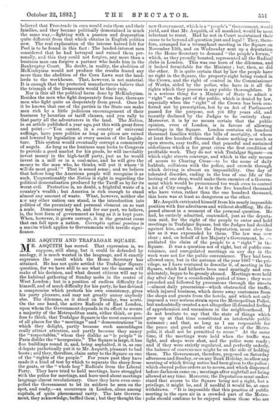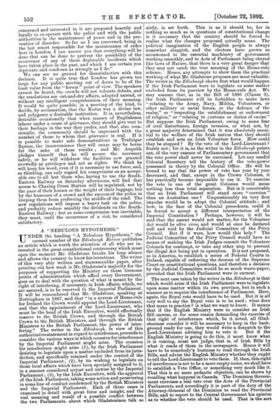MR. ASQUITH AND TRAFALGAR SQUARE.
MR. ASQ1TITH has scored. That expression is, we suppose, still slang, but it could be defended by analogy, it is much wanted in the language, and, it exactly expresses the result which the Home Secretary has attained. He has not quite settled the Trafalgar Square question, for we have still to see what use the masses will make of his decision, and what decent citizens will say to the habitual gathering of Sunday mobs in the centre of West London ; but in 'a position of endless difficulty for himself, and of much difficulty for his party, he has devised a compromise which protects his own consistency, gives his party pleasure, and may not greatly annoy anybody else. The dilemma, as it stood on Tuesday, was acute. On the one hand, the active Radicals of East London, upon whom the Government depends in its effort to secure a majority of the Metropolitan seats, either think, or pro- fess to think, that Trafalgar Square is the most convenient of all places for the "meetings " and " demonstrations "in which they delight, partly because such assemblages really attract attention, and partly because they annoy the " respectables," whom they dislike as "le peuple " in Paris dislike the "bourgeoisie." The Square is large, it has fine buildings round it, and, being asphalted, it is, as one delegate pathetically put it to Mr. Asquith, pleasant to bad boots ; and they, therefore, claim entry to the Square as one of the "rights of the people." For years past they have made it a kind of test by which to separate the sheep from the goats, or the "whole hog" Radicals from the Liberal Party. They have tried to hold meetings, have struggled with the police for meetings, and have used about meetings language almost revolutionary. Once they have even com- pelled the Government to let its soldiers be seen on the spot, and ready,—an occurrence in London, alone among capitals, of quite phenomenal rarity. The late Govern- ment, they acknowledge, baffled them ; but they thought the i new Government, which is a " people's " Government, would yield, and that Mr. Asquith, of all mankind, would be most reluctant to resist. Had he not in Court maintained their cause to be beyond all question just and legal ? They, there- fore, arranged for a triumphant meeting in the Square on November 13th, and on Wednesday sent up a deputation to the Home Secretary to demand "the people's forum," which, as they proudly boasted, represented all the Radical clubs in London. This was one horn of the dilemma, and it looked formidable for the Ministry ; but, then, so did the other. It is quite certain that by law the people have no right in the Square, the property-right being vested in the Crown, and the right of control in the Commissioner of Works, aided by the police, who have in it all the rights which they possess in any public thoroughfare. It is a serious thing for a Minister of State to admit a " right " on the part of the public, which is denied by law, especially when the " right ' of the Crown has been con- ferred not by prescription, but by an Act of Parliament passed for the purpose, not yet fifty years old, and recently declared by the Judges to be entirely clear. Moreover, it is by no means certain that the public opinion, even of London, is in favour of allowing meetings in the Square. London contains six hundred thousand families within the bills of mortality, of whom at least five hundred thousand desire nothing so much as open streets, easy traffic, and that peaceful and sustained. orderliness which is for great cities the first condition of profitable work. They do not wish Trafalgar Square—on which eight streets converge, and which is the only means of access to Charing Cross—to be the scene of daily hubbub, collisions with the police, and crowds through which driving is almost an impossibility. One day of tolerated disorder, ending in the loss of one life or the looting of one shop, would make them enemies of a Govern- ment which would be pronounced too weak even to control a lot of City roughs. As it is the five hundred thousand who have votes, rather than the one hundred thousand, this horn was at least as dangerous as the other.
Mr. Asquith extricated himself from his nearly impossible position with fine adroitness and without shuffling. He dis- posed almost in a moment of the personal question. He had, he entirely admitted, contended, just as the deputa- tion said, for the right of the people to enter and hold meetings in Trafalgar Square, but the Judges had decided against him, and he, like the Deputation, must obey the law as it was expounded by them. The law was now clear ; and, on behalf of her Majesty's Government, he P. pudiated the claim of the people to a " right " in the Square. It was a question not of right, but of public con- venience, and unregulated meetings on any day in the week were not for the public convenience. They had been allowed once, but in the autumn of the year 1887 "the pri- vilege, as I have ventured to describe it, of meeting in the Square, which had hitherto been used sparingly and con- siderately, began to be grossly abused. Meetings were held day after day for a considerable period of time ; they were preceded and followed by processions through the streets —almost daily processions—which obstructed the traffic, which injured business, which drove away customers from the shops and guests from the hotels, and which not only imposed a very serious strain upon the Metropolitan Police, but undoubtedly created a not altogether ill-founded feeling of apprehension and uneasiness in the neighbourhood. I do not hesitate to say that the state of things which grew up at that time constituted an intolerable public nuisance ; and that, so long as I am responsible for the peace and good order of the streets of the Metro- polis, it shall not be permitted to recur." At the same time, if the meetings were held when the traffic was light, and shops were shut, and the police were ready ; and if they were strictly regulated, and perfectly orderly, the balance of convenience might be on the side of holding them. The Government, therefore, proposed on Saturday afternoon and Sunday, or on any Bank Holiday, to allow any meeting of which fitting notice had been given to the police ; which obeyed police orders as to access, and which dispersed before darkness came on ; meetings after nightfall not being allowed at any time. Moreover, the Deputation must under- stand that access to the Square being not a right, but a privilege, it might be, and if needful it would be, at once withdrawn. ." It is impossible that this practice of public meeting in the open air in a crowded part of the Metro= polis should continue to be enjoyed unless those who are concerned and interested in it are prepared heartily and loyally to co-operate with the police and with the public authorities in the maintenance of peace and. in the pre- vention of disorder. So far as I am concerned, being in the last resort responsible for the maintenance of order here in London, I can assure you that everything will be done that can be done to prevent the possibility of the recurrence of any of those deplorable incidents which have taken place in the past, and which I am certain you deprecate and condemn as strongly as I do." We can see no ground for dissatisfaction with this decision. It is quite true that London has grown too large for any public meeting out of doors to be of the least value from the " forum " point of view. The speakers cannot be heard, the crowds will not tolerate debate, and the resolutions are cut-and-dry affairs, adopted unread, or without any intelligent comprehension of their meaning. It would be quite possible, in a meeting of the kind, to decide, by acclamation, that the Koran was a divine law, and polygamy a desirable institution. It is, nevertheless, desirable occasionally that when masses of Englishmen labour under a sense of grievance, they should give vent to their feelings in the way they prefer, and that, also occa- sionally, the community should be impressed with the number of those to whom that grievance is real. If it is possible to make safe demonstrations in Trafalgar Square, the inconvenience they will cause may be borne for the sake of these results ; and Mr. Asquith pledges himself that he will secure the necessary safety, or he will withdraw the facilities now granted avowedly as privileges and not as rights. We think he will keep his word, even if it is necessary to use force, and, so thinking, can only regard his compromise as an accept- able one to all but those who, having to use the South- Eastern Railway on Saturday afternoons, will find that access to Charing Cross Station will be regulated, not by the pace of their horses or the weight of their luggage, but by the humours of a crowd and the success of the police in keeping them from preferring the middle of the road. The new regulations will impose a heavy task on the police, and. probably reduce sensibly the dividends on the South- Eastern Railway ; but as some compromise was inevitable, they must, until the occurrence of a riot, be considered satisfactory.







































 Previous page
Previous page